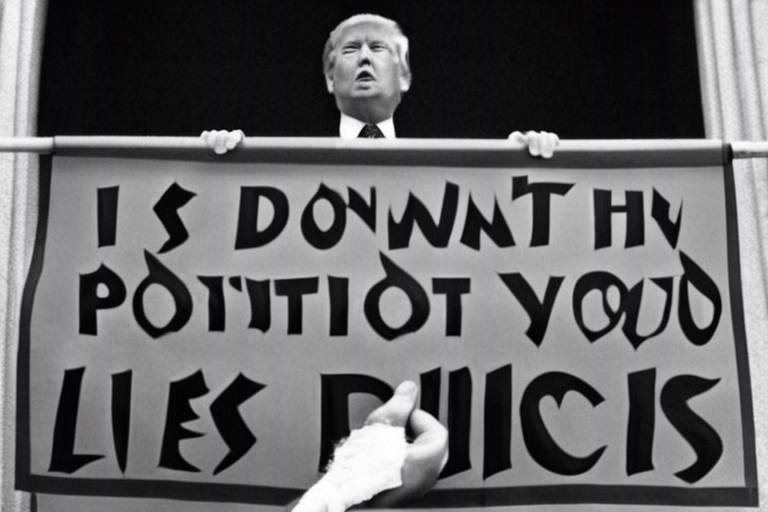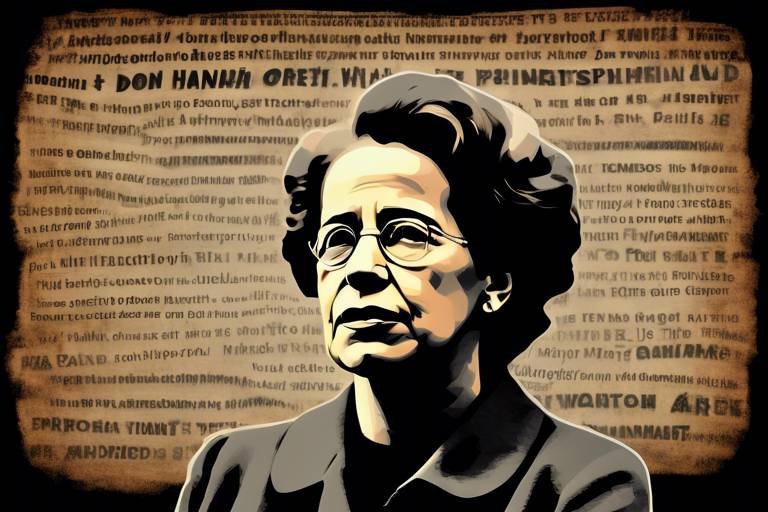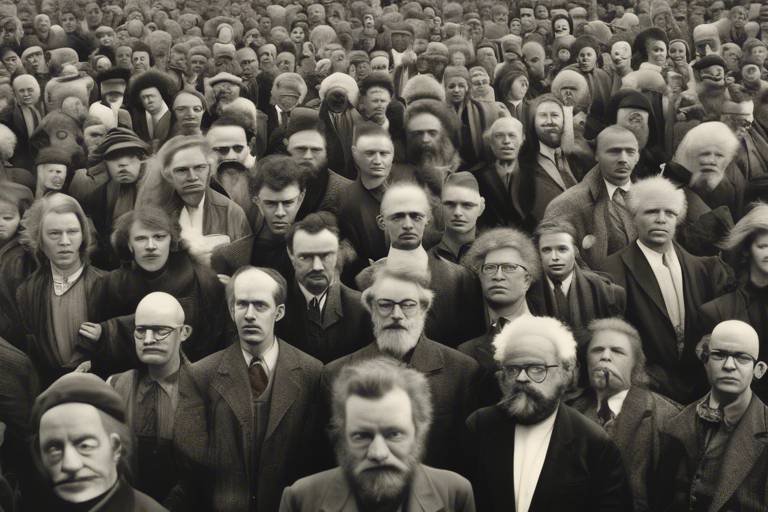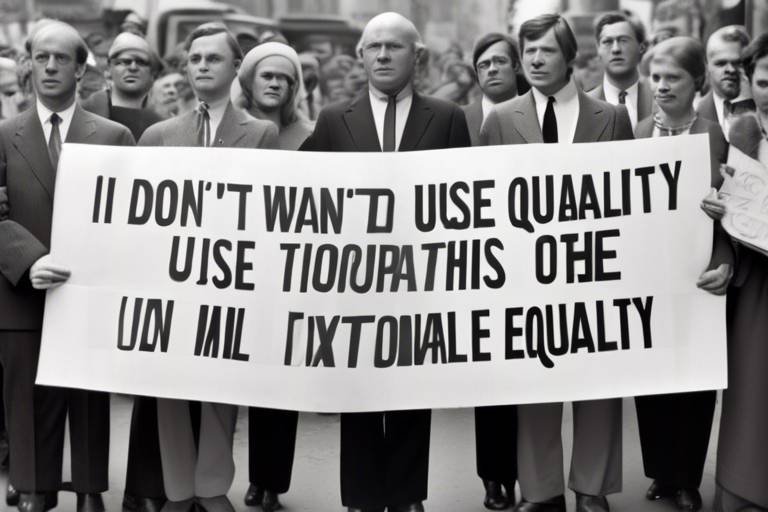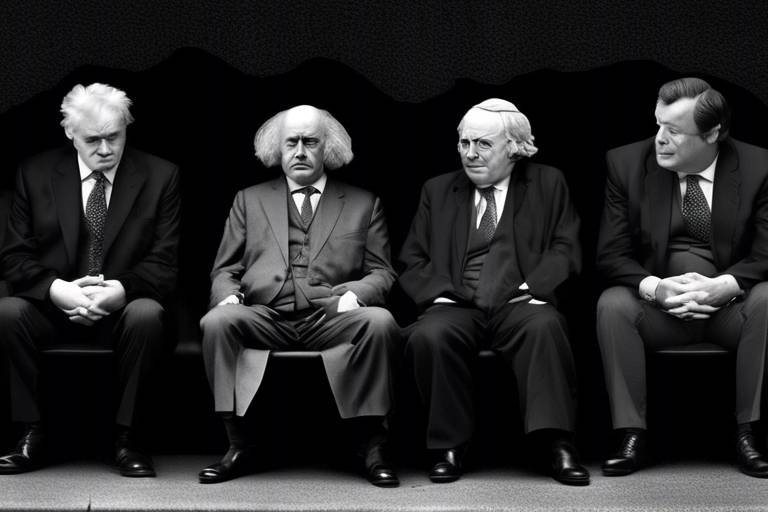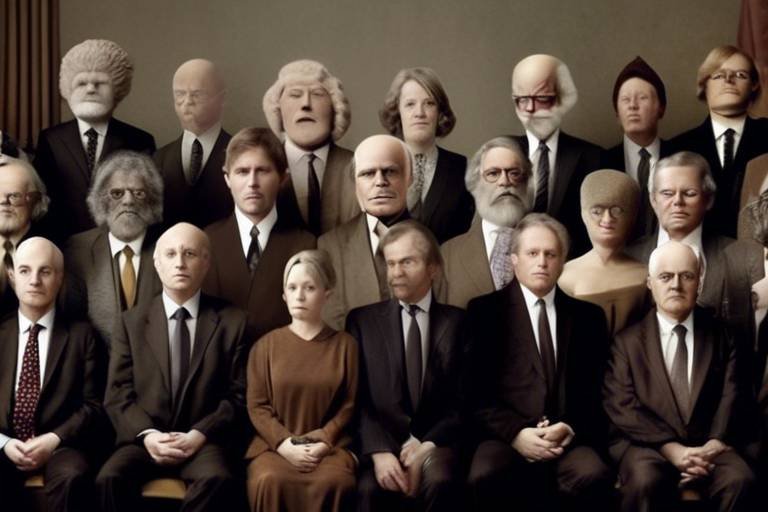Truth and Lies in Politics - A Philosophical Perspective
Politics, in its very essence, is a battleground where truth and deception often clash, creating a complex tapestry of narratives that shape our societies. Understanding this intricate relationship is crucial for anyone who wants to navigate the murky waters of political discourse. At its core, the concept of truth in politics is not just about the facts; it's about how those facts are perceived and interpreted by the public. Philosophers have long debated the nature of truth, and their insights can provide valuable context for understanding contemporary political dynamics.
When we talk about truth in politics, we are not merely discussing objective reality. Instead, we are delving into a realm where perception often outweighs reality. For instance, what one group may consider an undeniable truth, another may dismiss as a blatant lie. This divergence is influenced by various factors, including cultural backgrounds, media consumption, and individual experiences. In this way, truth becomes a subjective construct, molded by the narratives that dominate public discourse.
Moreover, the implications of truth in politics extend far beyond mere semantics. They directly influence public perception and trust in political institutions. When citizens perceive their leaders as honest and transparent, they are more likely to engage with the political process and support policies that benefit the greater good. Conversely, a lack of trust can lead to apathy, disillusionment, and even civil unrest. Therefore, understanding the philosophical underpinnings of truth is essential for fostering a healthy democratic environment.
As we explore the role of deception in politics, it becomes evident that it can take many forms. From outright lies to strategic ambiguity, the methods employed by politicians to manipulate public perception are as varied as they are impactful. The ethical implications of such deception raise important questions: Is it ever justifiable for a politician to lie? Can deception be a necessary tool for the greater good? These are not just rhetorical questions; they are fundamental inquiries that challenge our understanding of morality in political contexts.
To further illustrate these points, consider the historical examples of political deception that have left indelible marks on society. The Watergate scandal, for instance, serves as a pivotal moment in American political history, showcasing how lies can erode public trust and lead to significant consequences for governance. Similarly, the justifications for the Iraq War provide a stark reminder of how misleading information can have far-reaching political and social ramifications, ultimately questioning the integrity of political discourse.
As we navigate the complexities of truth and lies in politics, it's essential to recognize the role of social media in shaping these dynamics. In today's digital age, the lines between truth and deception are increasingly blurred, with platforms acting as both amplifiers and gatekeepers of information. This evolution has transformed political communication, creating an environment where misinformation can spread like wildfire, often outpacing efforts to correct it.
In conclusion, the philosophical exploration of truth and lies in politics is not merely an academic exercise; it is a vital inquiry that resonates with our everyday lives. As we grapple with these concepts, we must remain vigilant, questioning the narratives presented to us and striving for a deeper understanding of the forces that shape our political landscape.
- What is the significance of truth in politics? Truth is essential for public trust and democratic engagement, influencing how citizens interact with their governments.
- How does deception impact political processes? Deception can undermine trust, lead to public disillusionment, and ultimately threaten the integrity of democratic systems.
- Can social media be a force for good in political discourse? While social media can spread misinformation, it also provides a platform for fact-checking and accountability, making it a double-edged sword.

The Nature of Truth in Politics
Understanding the concept of truth in politics is not just a philosophical exercise; it is a vital component that shapes the very fabric of our democratic societies. Truth can be slippery, often distorted by the interests of those in power. At its core, truth in politics refers to the accuracy and honesty of information presented to the public. However, it’s crucial to recognize that truth is not always black and white. Philosophers have long debated its nuances, leading to various interpretations that can significantly influence political discourse.
In the realm of politics, truth is often intertwined with perception. What one person sees as the truth, another might view as a lie, depending on their experiences, beliefs, and biases. This subjectivity complicates the relationship between truth and politics. For instance, a politician's statement may be factually correct but presented in a way that misleads the public, raising questions about the ethical implications of such communication. As we navigate this complex landscape, it becomes clear that understanding the nature of truth is essential for fostering public trust.
Moreover, the impact of truth in politics extends beyond mere facts. It influences public perception, voter behavior, and ultimately, the health of democracy itself. When citizens feel they are being told the truth, they are more likely to engage in the political process. Conversely, a lack of trust can lead to apathy and disengagement, undermining the very foundations of democratic governance. To illustrate this point, consider the following table that outlines the relationship between truth, trust, and political engagement:
| Truth Perception | Public Trust Level | Political Engagement |
|---|---|---|
| High | High | Active Participation |
| Moderate | Moderate | Occasional Participation |
| Low | Low | Apathy |
As this table illustrates, the correlation between truth and political engagement is undeniable. When the public perceives truthfulness in political communication, it fosters a sense of trust that encourages active participation in civic life. However, when deception or misinformation prevails, it can lead to significant disengagement and disillusionment with the political process.
In conclusion, the nature of truth in politics is complex and multifaceted. It is not merely about the accuracy of statements but also about the broader implications of how those truths are communicated and perceived. As we continue to explore the intricate relationship between truth and politics, it is essential to remain vigilant and critical of the information we consume, ensuring that we hold our leaders accountable and strive for a political landscape grounded in honesty and integrity.

The Role of Deception
Deception in politics is a complex and multifaceted phenomenon that can take on various forms, ranging from outright lies to subtle manipulations of truth. At its core, deception serves as a tool for politicians to shape narratives, influence public opinion, and ultimately achieve their goals. But why do politicians resort to deception in the first place? The answer often lies in the pursuit of power and the desire to maintain control over the political landscape.
One of the most insidious aspects of deception is that it can be incredibly effective, leading to a significant impact on democratic processes and public trust. When politicians engage in deceptive practices, they can create a false sense of reality that sways voters and alters the course of elections. The ethical implications of such actions are profound, raising questions about the integrity of political systems and the moral responsibilities of those in power.
Consider the various forms that deception can take in the political arena:
- Misinformation: This involves spreading false or misleading information intentionally to confuse or mislead the public.
- Strategic Ambiguity: Politicians may choose to be vague in their statements, allowing for multiple interpretations that can mislead audiences without outright lying.
- Spin: This refers to presenting information in a biased manner to influence public perception positively or negatively.
Each of these tactics can erode public trust and undermine the very foundations of democracy. When citizens feel they cannot rely on their leaders to provide honest and transparent information, disillusionment sets in. This disillusionment can lead to apathy, where voters disengage from the political process altogether, or worse, it can breed cynicism, where individuals believe that all politicians are inherently dishonest.
Moreover, the consequences of political deception extend beyond just the immediate impact on elections. They can lead to long-term ramifications for governance and public policy. For instance, when deceptive practices become normalized, it creates a culture where honesty is undervalued, and accountability is diminished. This environment can foster corruption and inefficiency, as leaders may feel emboldened to prioritize their interests over those of the public.
In essence, the role of deception in politics is not merely a matter of individual actions but a reflection of broader systemic issues. It challenges the very essence of democratic ideals, where informed citizenry is crucial for effective governance. As such, it is vital for both politicians and the public to engage in a continuous dialogue about the importance of truthfulness and transparency in political discourse.
- Why do politicians lie? Politicians may lie to gain an advantage, manipulate public opinion, or distract from unfavorable issues.
- What are the consequences of political deception? Consequences can include loss of public trust, voter disengagement, and long-term damage to democratic institutions.
- How can citizens combat political deception? Citizens can stay informed through reputable sources, engage in critical thinking, and support fact-checking initiatives.

Historical Examples of Political Deception
Throughout history, political deception has been a powerful tool wielded by leaders to manipulate public perception and achieve their objectives. These instances of deceit not only shaped the course of nations but also left lasting impacts on the trust citizens place in their governments. Understanding these historical examples provides critical insights into the ongoing struggle between truth and falsehood in politics.
One of the most notorious examples of political deception is the Watergate Scandal. This scandal, which unfolded in the early 1970s, involved a break-in at the Democratic National Committee headquarters and a subsequent cover-up by members of President Richard Nixon's administration. The attempt to mislead the public and obstruct justice ultimately led to Nixon's resignation, illustrating how lies can erode public trust and undermine democratic institutions. The fallout from Watergate not only changed the political landscape of the United States but also served as a cautionary tale about the consequences of deception in governance.
Another significant instance is the justification for the Iraq War in 2003. The U.S. government, under President George W. Bush, claimed that Iraq possessed weapons of mass destruction (WMDs) and posed an imminent threat. However, these assertions were later proven to be unfounded, leading to widespread skepticism and anger among the public. The misleading information presented to justify the war resulted in not only a catastrophic conflict but also a profound questioning of the integrity of political discourse. This example starkly highlights how deception can have dire political and social ramifications, affecting not just the immediate context but also international relations and public trust in government.
In examining these historical examples, it becomes evident that political deception often follows a pattern. Leaders may employ tactics such as misinformation, strategic ambiguity, and outright lies to achieve their aims. The consequences of these actions can be far-reaching, leading to loss of life, social unrest, and a decline in civic engagement. To further illustrate this point, consider the following table that summarizes key events of political deception:
| Event | Year | Type of Deception | Consequences |
|---|---|---|---|
| Watergate Scandal | 1972-1974 | Cover-up | Resignation of President Nixon, loss of public trust |
| Iraq War Justifications | 2003 | Misinformation | Prolonged conflict, loss of credibility for U.S. government |
These examples serve as reminders of the delicate balance between truth and deception in the political arena. They compel us to question the narratives presented to us and to seek out the truth, even when it is obscured by layers of deceit. As we navigate today's complex political landscape, it is crucial to remain vigilant and critical of the information we consume, understanding that the implications of deception can reverberate for generations.
- What are some common forms of political deception? Political deception can take many forms, including misinformation, strategic ambiguity, propaganda, and outright lies.
- How does political deception affect public trust? Political deception can significantly erode public trust, leading to skepticism towards government institutions and officials.
- Can historical examples of political deception inform current political practices? Yes, studying historical instances of political deception can provide valuable lessons on the importance of transparency and accountability in governance.

The Watergate Scandal
The Watergate scandal stands as one of the most infamous episodes in American political history, serving as a stark reminder of the **fragility of trust** between the government and its citizens. It all began with a seemingly innocuous break-in at the Democratic National Committee headquarters in the Watergate office complex in Washington, D.C. on June 17, 1972. However, what unfolded was a complex web of **deception, cover-ups, and political fallout** that would ultimately lead to the resignation of President Richard Nixon. This scandal is not just a story of political intrigue; it’s a profound lesson on the consequences of lying in governance.
At its core, the Watergate scandal exemplifies how **political deception** can unravel the very fabric of democracy. Initially, the break-in was dismissed as a minor incident, but as investigations progressed, it became clear that the Nixon administration was involved in a systematic effort to **cover up their wrongdoing**. This included attempts to obstruct justice, manipulate the media, and mislead the public. The scandal revealed a **culture of deceit** that permeated the highest levels of government, showcasing how far some leaders might go to maintain power.
As the scandal unfolded, it was **journalists Bob Woodward and Carl Bernstein** of The Washington Post who played a pivotal role in uncovering the truth. Their relentless pursuit of the story highlighted the importance of a free press in holding power accountable. This investigation not only exposed the lies surrounding Watergate but also ignited a nationwide conversation about the **ethical responsibilities of public officials**. The revelations led to a series of Senate hearings, which brought forth testimony from key figures, including White House aides and even Nixon himself.
The fallout from the Watergate scandal was monumental. Public trust in government plummeted, and the political landscape of the United States was forever altered. Nixon’s resignation on August 8, 1974, marked the first time a sitting president had left office in such a manner. It served as a powerful reminder that no one is above the law, and that **truth and transparency** are essential for a healthy democracy. The scandal also prompted significant reforms, including campaign finance laws and greater oversight of political activities, aimed at preventing such abuses of power in the future.
In conclusion, the Watergate scandal is a cautionary tale about the dangers of political deception. It underscores the necessity for accountability and the role of citizens and the media in safeguarding democracy. As we reflect on this pivotal moment in history, we must ask ourselves: how can we ensure that the mistakes of the past are not repeated? The answer lies in our collective commitment to **truth and integrity** in politics.
- What was the Watergate scandal?
The Watergate scandal was a political scandal involving a break-in at the Democratic National Committee headquarters and the subsequent cover-up by the Nixon administration. - What were the consequences of the Watergate scandal?
The scandal resulted in President Nixon's resignation and a significant decline in public trust in government. - How did the media influence the Watergate scandal?
Journalists played a crucial role in investigating and exposing the truth behind the scandal, highlighting the importance of a free press.

The Iraq War Justifications
The justifications for the Iraq War, initiated in 2003, stand as a remarkable case study in the realm of political deception. At the heart of the matter was the assertion that Iraq possessed weapons of mass destruction (WMDs), which posed an imminent threat to global security. The U.S. government, led by President George W. Bush, along with key allies, argued that military intervention was necessary to prevent a potential catastrophe. However, as the dust settled, the reality of the situation painted a different picture, one that raised serious questions about the integrity of political discourse.
Initially, the narrative was compelling. The Bush administration presented a series of intelligence reports and public statements that suggested a clear and present danger. For instance, the infamous claim that Iraq could deploy WMDs within 45 minutes was made with alarming confidence. This assertion was echoed across various media platforms, creating a sense of urgency that galvanized public support for military action. But as investigations unfolded, it became evident that these claims were either exaggerated or entirely unfounded, leading to a profound erosion of trust in government institutions.
To understand the implications of the Iraq War justifications, we can break down the key elements that contributed to the public's acceptance of these claims:
- Selective Intelligence: The administration cherry-picked intelligence that supported their case while ignoring dissenting views from experts who warned against the rush to war.
- Media Complicity: Many media outlets uncritically reported the government's assertions, failing to conduct thorough investigations that could have challenged the narrative.
- Fear-Mongering: The use of fear as a tool was prevalent. The idea that Saddam Hussein was a threat to the United States and its allies was amplified, creating a climate where dissent was often labeled as unpatriotic.
These factors combined to create a powerful justification for the invasion, but the aftermath revealed the stark reality. No WMDs were found, and the intelligence failures led to widespread criticism of the administration. The consequences of this deception were far-reaching, resulting in not only a protracted conflict but also significant loss of life and destabilization in the region.
In retrospect, the justifications for the Iraq War serve as a cautionary tale. They illustrate how the manipulation of truth can lead to disastrous outcomes, fundamentally altering the political landscape. The erosion of public trust in government is a long-lasting consequence, as citizens grapple with the realization that they were misled. This situation poses critical questions about accountability and the ethical responsibilities of political leaders. What safeguards can be put in place to prevent such deceptions in the future? How can the public be better informed to discern fact from fiction in political discourse?
Ultimately, the Iraq War justifications remind us of the delicate balance between truth and deception in politics, urging both leaders and citizens to prioritize transparency and integrity in the pursuit of justice and peace.
- What were the main justifications for the Iraq War? The primary justifications included the belief that Iraq possessed WMDs and posed a threat to global security, as well as the desire to promote democracy in the region.
- What was the outcome of the Iraq War? The war led to significant loss of life, destabilization of Iraq, and a long-term military presence by the United States, ultimately raising questions about the effectiveness of the intervention.
- How did the public react to the justifications? Initially, there was strong public support for the war, but as it became clear that the justifications were unfounded, public trust in the government declined significantly.

Philosophical Perspectives on Lying
When we dive into the murky waters of political deception, we find ourselves confronted with a myriad of philosophical perspectives on lying. Philosophers throughout history have grappled with the morality of deceit, especially in the political arena where stakes are high and consequences are far-reaching. Take Immanuel Kant, for instance. His categorical imperative suggests that lying is inherently wrong, regardless of the context or potential outcomes. For Kant, honesty is not just a policy; it's a moral duty. This perspective raises an intriguing question: can a lie ever be justified if it serves a greater good?
On the flip side, we have consequentialist thinkers like John Stuart Mill, who argue that the morality of an action is determined by its outcomes. From this viewpoint, if a lie can prevent harm or promote happiness, then it might be considered acceptable. This creates a fascinating tension in political discourse, where leaders often justify deception as a means to an end. But does this mean that politicians can freely manipulate the truth? The answer is a resounding "maybe," but it comes with a heavy caveat: the risk of eroding trust in the very institutions that uphold democracy.
Furthermore, the concept of "noble lies," as proposed by Plato, introduces another layer of complexity. Plato suggested that sometimes, leaders might need to deceive their citizens for the sake of social harmony or stability. This idea can be quite seductive, especially in times of crisis when the public's reaction might be unpredictable. However, one must ask: does the end truly justify the means? Are we willing to sacrifice transparency for the illusion of security?
To better understand these philosophical perspectives, let’s explore some key arguments:
- Kantian Ethics: Lying is inherently wrong, regardless of the consequences.
- Consequentialism: The morality of lying is determined by its outcomes—if it leads to a greater good, it may be justified.
- Noble Lies: Sometimes, deception is necessary for the greater good of society.
Ultimately, these philosophical debates illuminate the intricate relationship between truth and deception in politics. They compel us to reflect not only on the actions of our leaders but also on the moral frameworks that guide their decisions. As citizens, we must navigate this complex landscape and hold our political figures accountable. After all, in a world where information is power, discerning truth from lies becomes not just a personal responsibility but a civic duty.
- What is the main ethical concern regarding lying in politics? The primary concern is whether lying undermines public trust and the integrity of democratic processes.
- Can lying ever be justified in politics? Philosophical perspectives vary; while some argue that it can be justified for the greater good, others insist that honesty is a fundamental moral duty.
- How does social media influence political deception? Social media can amplify misinformation and create echo chambers, making it easier for lies to spread and harder for the truth to be discerned.

The Impact of Social Media
In today's digital age, social media has become a powerful force in shaping political discourse. Platforms like Facebook, Twitter, and Instagram have not only changed how we communicate but also how information is disseminated and consumed. The speed at which information travels on these platforms can be both astonishing and alarming. Have you ever scrolled through your feed and stumbled upon a headline that made your heart race, only to find out later that it was misleading? This phenomenon raises important questions about the credibility of information we encounter daily.
One of the most significant impacts of social media is its ability to blur the lines between truth and deception. Unlike traditional media, which typically undergoes a rigorous editorial process, social media allows anyone to share information, regardless of its accuracy. This democratization of information can lead to a proliferation of misinformation and fake news, making it challenging for the average user to discern what is factual. In fact, studies have shown that false information spreads significantly faster than the truth on social media platforms. This creates a landscape where individuals are often left in the dark, questioning what to believe.
Moreover, social media has given rise to the phenomenon of echo chambers and filter bubbles. These are environments where users are exposed only to information that aligns with their existing beliefs, effectively isolating them from opposing viewpoints. Imagine living in a bubble where every conversation reinforces your ideas, making it easy to dismiss any contradictory information as false or biased. This can lead to increased political polarization, where individuals become more entrenched in their views, further complicating the landscape of political discourse.
To illustrate this impact, consider the following table that summarizes key differences between traditional media and social media:
| Aspect | Traditional Media | Social Media |
|---|---|---|
| Content Creation | Professional journalists and editors | Anyone can create and share content |
| Information Verification | Fact-checking processes | Limited or no verification |
| Speed of Dissemination | Slower, due to editorial processes | Instantaneous sharing |
| Audience Engagement | One-way communication | Interactive and participatory |
As we navigate this complex terrain, the role of fact-checking organizations has become increasingly vital. These organizations aim to hold politicians and public figures accountable for their statements, providing a necessary counterbalance to the rampant spread of misinformation. However, the effectiveness of these initiatives can vary widely, and they often face challenges in reaching audiences that are entrenched in their beliefs. It's essential for individuals to take an active role in verifying information, rather than passively accepting what they see on their feeds.
In conclusion, the impact of social media on political discourse is profound and multifaceted. While it has the potential to empower individuals and foster democratic engagement, it also poses significant challenges in the form of misinformation and polarization. As we continue to engage with these platforms, it’s crucial to remain vigilant and critical of the information we consume. After all, in a world where a single tweet can influence public opinion, understanding the implications of social media is more important than ever.
- How does social media affect political polarization?
Social media can create echo chambers that reinforce existing beliefs, making it difficult for individuals to encounter opposing viewpoints. - What role do fact-checking organizations play?
Fact-checking organizations aim to verify information and hold public figures accountable, helping combat misinformation. - Can social media be a tool for positive political engagement?
Yes, when used responsibly, social media can facilitate democratic dialogue and increase political awareness.

Echo Chambers and Filter Bubbles
In today's digital age, the way we consume information has drastically shifted, leading to the emergence of echo chambers and filter bubbles. These phenomena occur when individuals are exposed predominantly to information that reinforces their existing beliefs, creating a kind of insulated environment where dissenting views are marginalized or completely absent. Imagine standing in a room where every sound bounces back at you—this is akin to how echo chambers work, amplifying your own ideas while drowning out alternative perspectives. It's a cozy yet dangerous space that can distort reality and skew our understanding of complex issues.
Echo chambers often thrive on social media platforms, where algorithms curate content based on user preferences. This means that if you frequently engage with specific types of political content, you are likely to see more of it, while opposing viewpoints are systematically filtered out. This selective exposure can lead to a skewed perception of reality, where individuals believe that their views are more widely accepted than they actually are. The result? A deepening divide in public opinion, where each side becomes more entrenched in their beliefs, making constructive dialogue increasingly difficult.
Moreover, filter bubbles can create a false sense of consensus, leading individuals to underestimate the prevalence of opposing views. This can have significant implications for political discourse. For instance, when individuals are unaware of the diverse opinions that exist in society, they may perceive their own views as being under attack, which can foster hostility and polarization. To illustrate this point, consider the following table that outlines the key differences between echo chambers and filter bubbles:
| Aspect | Echo Chambers | Filter Bubbles |
|---|---|---|
| Definition | Environments where like-minded individuals reinforce each other's beliefs. | Personalized information environments that limit exposure to differing viewpoints. |
| Mechanism | Active participation in discussions that favor specific ideologies. | Algorithms that tailor content based on user behavior. |
| Impact | Increased polarization and hostility towards opposing views. | False sense of consensus and misunderstanding of societal views. |
So, what can we do to break free from these echo chambers and filter bubbles? One effective strategy is to actively seek out diverse sources of information. Engaging with media that presents a range of perspectives can help broaden our understanding and foster empathy towards those with differing opinions. Additionally, practicing critical thinking and questioning the information we consume can empower us to navigate the complex landscape of modern political discourse more effectively.
Ultimately, while echo chambers and filter bubbles may provide a sense of comfort and community, they come at the cost of a well-rounded understanding of the world. It's crucial for us to step outside our comfort zones and engage with a variety of viewpoints. By doing so, we can not only enrich our own perspectives but also contribute to a more informed and cohesive society.
- What are echo chambers? Echo chambers are environments where individuals are exposed primarily to information that aligns with their existing beliefs, leading to reinforced viewpoints.
- How do filter bubbles work? Filter bubbles occur when algorithms on social media platforms curate content based on user behavior, limiting exposure to diverse opinions.
- What are the consequences of echo chambers and filter bubbles? They can lead to increased polarization, hostility, and a distorted perception of societal consensus.
- How can I break free from echo chambers? Actively seek out diverse sources of information and engage with differing viewpoints to broaden your understanding.

Fact-Checking and Accountability
In an age where information travels at lightning speed, the importance of fact-checking has never been more pronounced. With political figures often making bold statements that can sway public opinion, the role of fact-checkers has emerged as a crucial element in maintaining the integrity of political discourse. Fact-checking organizations work tirelessly to verify claims made by politicians, ensuring that the information disseminated to the public is accurate and reliable. This process not only promotes accountability but also fosters a culture of transparency in governance.
However, the effectiveness of these initiatives can vary significantly. Many fact-checking organizations employ rigorous methodologies to assess the truthfulness of statements, often providing detailed explanations of their findings. For example, organizations like PolitiFact and FactCheck.org utilize a systematic approach to evaluate claims, which includes:
- Researching original sources
- Consulting experts in relevant fields
- Providing context to the statements being analyzed
Despite their efforts, fact-checking is not without its challenges. The sheer volume of misinformation can overwhelm these organizations, making it difficult to address every claim in real-time. Moreover, the rise of social media has complicated the landscape, as false information spreads rapidly and often goes unchecked. This situation raises an important question: How can we ensure that fact-checking remains effective in combating the tide of misinformation?
One potential solution lies in increasing public awareness of fact-checking resources. Educating citizens about how to access and interpret fact-checks can empower them to make informed decisions. Additionally, fostering a dialogue around the importance of truth in politics can encourage politicians to be more accountable for their statements. As the saying goes, "With great power comes great responsibility." This rings particularly true in the political arena, where leaders must recognize their obligation to provide accurate information.
In conclusion, fact-checking plays a vital role in promoting accountability within political discourse. While challenges remain, the ongoing efforts of fact-checking organizations and the engagement of the public can help bridge the gap between truth and deception. As we navigate this complex landscape, it is essential to remain vigilant and proactive in our pursuit of honesty in politics.
- What is fact-checking? Fact-checking is the process of verifying the accuracy of statements made by public figures, particularly politicians, to ensure that the information presented to the public is truthful.
- Why is fact-checking important in politics? Fact-checking is crucial because it helps maintain the integrity of political discourse, promotes accountability, and fosters public trust in political leaders.
- How can I access fact-checking resources? Many reputable fact-checking organizations have websites that provide easy access to their findings. Examples include PolitiFact, FactCheck.org, and Snopes.
- What challenges do fact-checkers face? Fact-checkers often struggle with the overwhelming amount of misinformation, the rapid spread of false claims on social media, and the need to provide timely responses to political statements.
Frequently Asked Questions
- What is the relationship between truth and deception in politics?
The relationship between truth and deception in politics is complex. While truth is essential for building trust and credibility, deception can be used strategically to manipulate public perception. Philosophically, this raises questions about the ethics of lying and the consequences it has on democratic processes.
- How does social media impact the spread of misinformation?
Social media platforms have revolutionized how information is shared, but they also facilitate the rapid spread of misinformation. With algorithms designed to keep users engaged, individuals often find themselves in echo chambers, where only information that aligns with their beliefs is presented, further blurring the lines between truth and lies.
- Can you provide examples of political deception in history?
Absolutely! Historical examples like the Watergate scandal and the justifications for the Iraq War highlight significant instances of political deception. These events not only shaped public opinion but also led to a profound erosion of trust in governmental institutions, illustrating the far-reaching consequences of lies in politics.
- What are echo chambers and filter bubbles?
Echo chambers and filter bubbles are phenomena where individuals are exposed primarily to information that reinforces their existing beliefs. This can create a skewed perception of reality and contribute to political polarization, making it challenging for individuals to engage with opposing viewpoints or recognize the truth.
- How effective are fact-checking organizations in promoting truth?
Fact-checking organizations play a crucial role in promoting accountability and truth in politics. By verifying claims made by politicians and public figures, they help combat misinformation. However, their effectiveness can vary, as some individuals may dismiss fact-checks that contradict their beliefs, highlighting the ongoing challenge of fostering a well-informed public.

